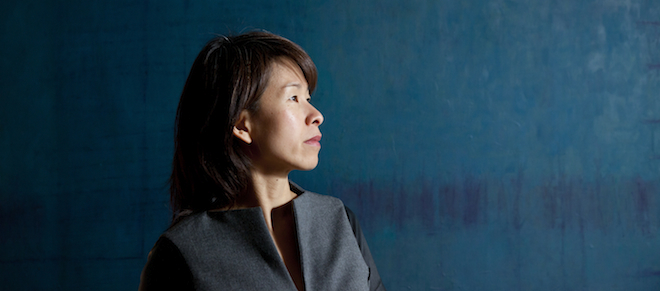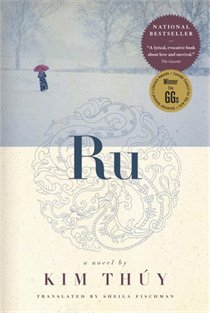Giller Prize nominee Kim Thúy on the fragility and power of books
Plus, an excerpt from the author’s semi-autobiographical novel, which details a harrowing journey from Vietnam to Canada
Author Kim Thuy in her home in a Montreal suburb on Thursday, October 11, 2012. Thuy is the author of Ru, a novel which won the 2010 Governor General’s Award for French language fiction, and an English translation which
Share

Much Like the central character in the Giller prize-nominated novel Ru, author Kim Thúy was born in Saigon in 1968, and came to Canada at age 10. “On March 27, 1979,” she says, “one of the few childhood dates I remember exactly.” Thúy is a trilingual Montrealer, although her Vietnamese is highly specialized. “I went back for four years when I was a lawyer in the late ’90s, so I speak it as a child or as a lawyer–nothing in between.” Ru, which has already won the French-language Governor General’s Literary Award, is many things, among them a series of memories and images offering the feel of the Vietnamese boat people’s experiences (what the Giller jury meant when it praised Ru for “reinventing the immigrant story”) and a kind of meditation on living within two cultures simultaneously. But it is a paen to love too, especially maternal love and the lengths to which mothers will go for their children. Here is Kim Thúy on the fragility and power of books, followed by an excerpt.
In my family we were readers, and we were surrounded by books. When the south of Vietnam fell to the north, the Communist soldiers who commandeered our house made an inventory of all our possessions, including the books, before confiscating them. My parents gave me the task of removing the most dangerous of the volumes, to avoid being punished too severely. A child dodging between the piles of books did not raise suspicion.
Since we were searched every time we entered or left the house, the safest way to destroy the books was to burn them on the rooftop at night. We had to tear out a few pages at a time, to keep the flames alive. Up until then, I’m sure I took books for granted. But this fire in the darkness forced me, at the age of 8, to understand that access to books was a privilege, both fragile and precious.
When our family arrived in Canada we were extremely poor. My mother and I earned two dollars a day, sewing. So it was unthinkable to consider spending $10 or $15 on a book—every cent was needed just for the essentials. We felt extremely fortunate when we received a gift from one of my younger brothers’ friends: an old Larousse dictionary with the cover stripped off. It was the only book we had in the house. In those early years, after we’d finished our homework, my mother would find snippets of text from store flyers to use for extra dictation practice.
Some years later my Uncle Qui, who was just seven years older than I, bought us our first new book. A critic on television had been raving about L’amant, by Marguerite Duras. The book cost him $15, an enormous sum. We knew that if we were still in Vietnam the same amount could have supported us for two weeks.
Uncle Qui lived with us. He spoke French before he came to Quebec, so he was able to read the book to me line by line, from the first page to the last, taking the time to explain to me the genius of Duras’s language. We also used the book for dictation exercises, and analyzed the grammatical and syntactical nuances of every word, from the first page to the last, so that every opportunity could be mined from this extravagant resource. According to my mother, the best way to acquire a language was to learn texts by heart. Thus, in time, I was able to recite the book from memory, from the first page to the last.
Today, I own all the works of Duras. I walk past them, there on my shelves, without opening them, without returning to them. Like an alcoholic who has taken the pledge, I must keep away. Otherwise I would fall in love with her again and begin again to speak with her voice, to think with her thoughts, to write with her words. The years have transformed my love for Duras into one for literature as a whole. And I’ve been given the great privilege to write, to play with words, to be surrounded with books again, 35 years later.
I came into the world during the Tet Offensive, in the early days of the Year of the Monkey, when the long chains of firecrackers draped in front of houses exploded polyphonically along with the sound of machine guns.
I first saw the light of day in Saigon, where firecrackers, fragmented into a thousand shreds, coloured the ground red like the petals of cherry blossoms or like the blood of the two million soldiers deployed and scattered throughout the villages and cities of a Vietnam that had been ripped in two.
I was born in the shadow of skies adorned with fireworks, decorated with garlands of light, shot through with rockets and missiles. The purpose of my birth was to replace lives that had been lost. My life’s duty was to prolong that of my mother.
My name is Nguy˜ên An T.inh, my mother’s name is Nguy˜ên An T˜?nh. My name is simply a variation on hers because a single dot under the i differentiates, distinguishes, dissociates me from her. I was an extension of her, even in the meaning of my name. In Vietnamese, hers means “peaceful environment” and mine “peaceful interior.” With those almost interchangeable names, my mother confirmed that I was the sequel to her, that I would continue her story.
The History of Vietnam, written with a capital H, thwarted my mother’s plans. History flung the accents on our names into the water when it took us across the Gulf of Siam 30 years ago. It also stripped our names of their meaning, reducing them to sounds at once strange, and strange to the French language. In particular, when I was 10 years old it ended my role as an extension of my mother.
Because of our exile, my children have never been extensions of me, of my history. Their names are Pascal and Henri, and they don’t look like me. They have hair that’s lighter in colour than mine, white skin, thick eyelashes. I did not experience the natural feelings of motherhood I’d expected when they were clamped onto my breasts at 3 a.m., in the middle of the night. The maternal instinct came to me much later, over the course of sleepless nights, dirty diapers, unexpected smiles, sudden delights.
Only then did I understand the love of the mother sitting across from me in the hold of our boat, the head of the baby in her arms covered with foul-smelling scabies. That image was before my eyes for days and maybe nights as well. The small bulb hanging from a wire attached to a rusty nail spread a feeble, unchanging light. Deep inside the boat there was no distinction between day and night. The constant illumination protected us from the vastness of the sea and the sky all around us. The people sitting on deck told us there was no boundary between the blue of the sky and the blue of the sea. No one knew if we were heading for the heavens or plunging into the water’s depths. Heaven and hell embraced in the belly of our boat. Heaven promised a turning point in our lives, a new future, a new history. Hell, though, displayed our fears: fear of pirates, fear of starvation, fear of poisoning by biscuits soaked in motor oil, fear of running out of water, fear of being unable to stand up, fear of having to urinate in the red pot that was passed from hand to hand, fear that the scabies on the baby’s head was contagious, fear of never again setting foot on solid ground, fear of never again seeing the faces of our parents, who were sitting in the darkness surrounded by 200 people.
Before our boat had weighed anchor in the middle of the night on the shores of Rach Gia, most of the passengers had just one fear: fear of the Communists, the reason for their flight. But as soon as the vessel was surrounded, encircled by the uniform blue horizon, fear was transformed into a hundred-faced monster who sawed off our legs and kept us from feeling the stiffness in our immobilized muscles. We were frozen in fear, by fear. We no longer closed our eyes when the scabious little boy’s pee sprayed us. We no longer pinched our noses against our neighbours’ vomit. We were numb, imprisoned by the shoulders of some, the legs of others, the fear of everyone. We were paralyzed.
My father had made plans, should our family be captured by Communists or pirates, to put us to sleep forever, like Sleeping Beauty, with cyanide pills. For a long time afterwards, I wanted to ask why he hadn’t thought of letting us choose, why he would have taken away our possibility of survival.
I stopped asking myself that question when I became a mother, when Dr. Vinh, a highly regarded surgeon in Saigon, told me how he had put his five children, one after the other, from the boy of 12 to the little girl of 5, alone, on five different boats, at five different times, to send them off to sea, far from the charges of the Communist authorities that hung over him. He was certain he would die in prison because he’d been accused of killing some Communist comrades by operating on them, even if they’d never set foot in his hospital. He hoped to save one, maybe two of his children by launching them in this fashion onto the sea. I met Dr. Vinh on the church steps, which he cleared of snow in the winter and swept in the summer to thank the priest who had acted as father to his children, bringing up all five, one after the other, until they were grown, until the doctor got out of prison.
Excerpted from Ru by Kim Thúy. Copyright © Sheila Fischman, 2012. Reprinted with permission of Random House of Canada Limited. All rights reserved.
